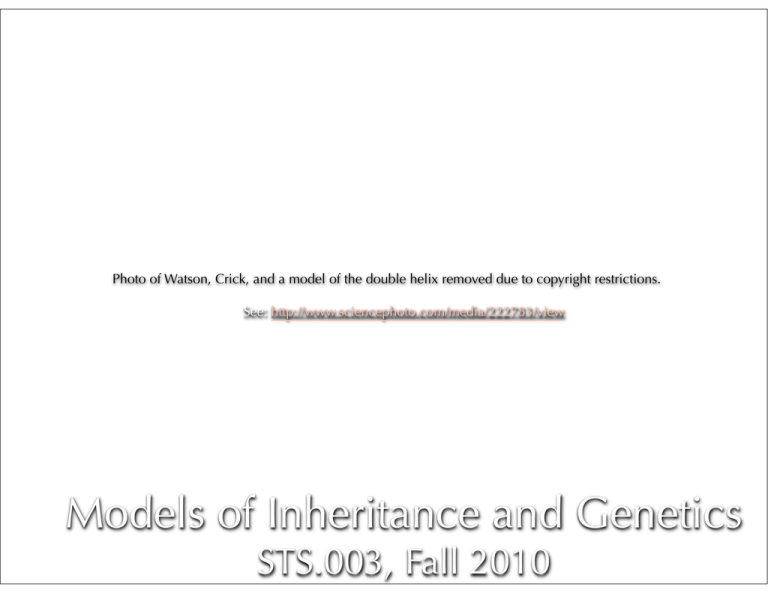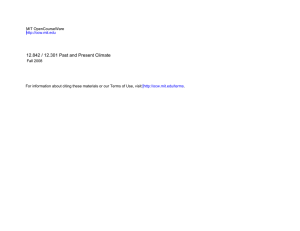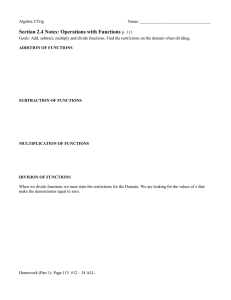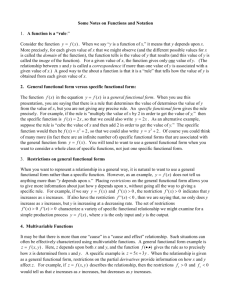Models of Inheritance and Genetics STS.003, Fall 2010 See:
advertisement

Photo of Watson, Crick, and a model of the double helix removed due to copyright restrictions. See: http://www.sciencephoto.com/media/222783/view Models of Inheritance and Genetics STS.003, Fall 2010 Unit 4: Body a. the physical frame or structure of man; b. the whole material organism viewed as an organic entity. (1) How do living creatures work? (2) Science and the ethics of research Overview Genetics from the 19th to the 21st centuries Highlights Controversies Photo of Dolly the sheep removed due to copyright restrictions. Aristotle: Matter vs. Form Photo courtesy of mattfoster on Flickr. Photo courtesy of davidjthomas on Flickr. Actual vs. Potential Intuitive Notions and Experience with Heredity Chart demonstrating that modern, domestic dog breeds are descendants of grey wolves removed due to copyright restrictions. Domesticated Animals Information is passed between generations Variation always occurs Popular Knowledge of Heredity: Hapsburg Noses and Lips Charles Darwin, Variation of Plants and Animals under Domestication (1868) Pangenesis Gemmules Blending inheritance Gregor Mendel 1865 August Weismann Germ cells vs. Somatic cells (1883) Wilhelm Johannsen “genes” (1909) Bacteriophage Hersey-Chase 1952 DNA Carries Genetic Information Photo of a bacteriophage removed due to copyright restrictions. Illustration of the Hersey-Chase blender experiment removed due to copyright restrictions. See: http://bit.ly/kreyR2 Photo of Watson, Crick, and a model of the double helix removed due to copyright restrictions. See: http://www.sciencephoto.com/media/222783/view “the structure has novel features which are of considerable biological interest” -- 1953 The Code of Life? Illustration of DNA within a cell removed due to copyright restrictions. Second Position C U U Crick, 1957: “Central Dogma” RNA, 1960 First Position (5' end) UUU UUC UUA UUG C CUU CUC CUA CUG A AUU AUC AUA AUG G GUU GUC GUA GUG Phe Leu Leu Ile Met Val UCU UCC UCA UCG CCU CCC CCA CCG ACU ACC ACA ACG GCU GCC GCA GCG A Ser UAU UAC UAA UAG Pro CAU CAC CAA CAG Thr AAU AAC AAA AAG Ala GAU GAC GAA GAG G Tyr Stop Stop His Gln Asn Lys Asp Glu UGU UGC UGA UGG CGU CGC CGA CGG AGU AGC AGA AGG GGU GGC GGA GGG Cys Stop Trp Arg Ser Arg Gly U C A G U C A G U C A G Third Position (3' end) U C A G Image by MIT OpenCourseWare. Human Genome Project Photo of President Bill Clinton talking about the human genome project removed due to copyright restrictions. “Today, we are learning the language in which God created life. We are gaining ever more awe for the complexity, the beauty, the wonder of God's most divine and sacred gift. With this profound new knowledge, humankind is on the verge of gaining immense, new power to heal. Genome science will have a real impact on all our lives -- and even more, on the lives of our children. It will revolutionize the diagnosis, prevention and treatment of most, if not all, human diseases.” -- Bill Clinton, 26 June 2000 Eugenics? Francis Galton (1883) “the science of improving the stock” “If a twentieth part of the cost and pains were spent in measures for the improvement of the human race that is spent on the improvement of the breed of horses and cattle, what a galaxy of genius we might create” “Three generations of imbeciles is enough” Race? Triangle plot of racial differentiation removed due to copyright restrictions. See: Admixture Triangle. Cover of “Scientific American” (December, 2003) with the cover “Does Race Exist?” removed due to copyright restrictions. “Races ... are thus rather like angels. Many people believe in them, devoutly. They can even tell you what properties they have. But the closer you try to examine them to discover their real nature, the more elusive they become.” -- Jonathan Marks, 2005 Determinism? Cover of “Concrete Boot,” a book in “The XYY Man” series by Kenneth Royce, removed due to copyright restrictions. Cover of “Time” (September 23, 1998) removed due to copyright restrictions. The cover story is entitled “The IQ Gene?” Engineering? Claude Bernard (1865) “man can probably never act as easily on animal or vegetable, as on mineral, species” Photo of Paul Berg removed due to copyright restrictions. 1972: Paul Berg creates a recombinant virus Chart demonstrating the increase in global area of biotechnology crops from 1996 to 2003 removed due to copyright restrictions. 1990s: Routinization of genetically engineered commodities Photo of a bottle of Hepatitis B Vaccine removed due to copyright restrictions. Image removed due to copyright restrictions: See: Synthetic Biology. (1) “Bring Your Genes to MIT”: As part of freshman orientation, all incoming students are asked (but not required) to submit a cheek swab in August for genetic analysis. Geneticists will screen three alleles, related to folate, lactose, and alcohol metabolism. Students will be given their results and then join in faculty-led discussions of the science and meaning of modern genetics. (2) Frustrated with the politicization of science in the United States, you move your reproductive biology lab from Boston to an unregulated overseas locale and set out to clone a human. (3) Now that large sections of the human and Neanderthal genomes have been sequenced, you set out to use targeted mutation technologies to transform a human cell line into a Neanderthal cell line and then use somatic cell nuclear transfer to produce a living Neanderthal. MIT OpenCourseWare http://ocw.mit.edu STS.003 The Rise of Modern Science Fall 2010 For information about citing these materials or our Terms of Use, visit: http://ocw.mit.edu/terms.



